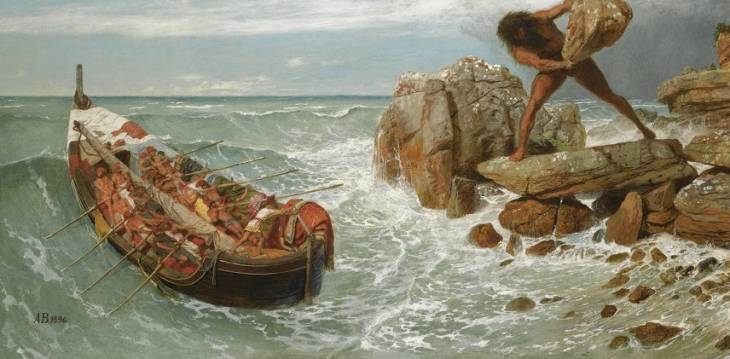The Epic Greek Mythology of Calypso Goddess, Nymph of The Island of Ogygia
The ancient Greek poet Homer describes the epic journey of legendary Greek hero Odysseus, king of Ithaca, who is imprisoned on a mythical island where he lives with a beautiful nymph named Calypso.

In Odyssey, the second of two epic poems attributed to the famed Greek poet Homer (the first being “The Iliad”), Homer recounts how legendary Greek king and hero Odysseus, also known by the Latin variant Ulysses, was shipwrecked on a mythical island of Ogygia during the course of his wanderings after the fall of Troy.
According to Homer's Odyssey, Calypso (daughter of the great titan Atlas and Pleione) who lived on the island of Ogygia detained Odysseus for seven years, but she could not overcome his longing for home even by promising him immortality. Calypso was eventually forced by Zeus, the king of the gods, to release the legendary king of Ithaca, and hero of Homer's epic poem, the Odyssey.
Calypso goddess
Greek mythology
Calypso was a ravishingly beautiful minor goddess and sea nymph who lived on the island of Ogygia with her maids, who were also nymphs. Nymphs in Greek mythology were any of a large class of inferior female deities who although not immortal were extremely long-lived and were on the whole mostly disposed toward men.
Calypso had been banished to the island of Ogygia after supporting the Titan gods in the First Titan War, also known as the Titanomachy, which was a ten year conflict fought between the Titans and the younger gods fighting from their future home of Mount Olympus.
When the Olympians defeated the Titans, they chained Atlas (the captain of the Titans) to a cliff and made him hold the weight of the entire sky, including the sky over the island of Ogygia. Calypso, being a loyal daughter, had supported her father Atlas during the Titan War. As punishment for supporting the Titans, the Olympians banished her to the remote island of Ogygia.
Every thousand of years, different heroes would drift up the shores of Ogygia, and Calypso couldn't help but fall in love with them. However, the Olympians made sure none of those heroes whom she fell for ever stayed with her, thus breaking Calypso’s heart for a thousand years until the next hero arrived only to break her heart again.
Homer, who’s two major poems are among the oldest and classic extant works of literature that are still read by contemporary audiences, writes that Odysseus of Ithaca drifted ashore the island of Ogygia after his fleet was destroyed by Zeus. Calypso soon fell obsessively in love with him.
Odysseus
Greek mythology
In Ogygia, Calypso receives the exhausted Greek hero Odysseus who had lost his ship and all his comrades after leaving Troy. Odysseus faced many trials on his journey home after the Trojan War, including loss of the ship and his army to land and sea monsters. The mythical goddess Calypso fell in love with him and wanted to make him her immortal husband and give him eternal youth.
But Odysseus was reluctant to accept Calypso's love and did not accept the offer of eternal youth. He was subsequently held captive on the island of Ogygia by the nymph Calypso for seven years as she tried to convince him to love her and accept her offer of eternal youth. Despite her love being rejected repeatedly, Calypso would continue to seduce him and hope he would love her back.
Calypso dreamed of going to Ithaca with the legendary king as a wife, but Odysseus was a proud, courageous man who was fiercely loyal to his human wife Penelope whom he longed for night and day, day and night. But he was shipwrecked and stranded on the island unable to leave.
Odysseus was also a man of great intellect and the master of disguise who came up with the plan to infiltrate the city of Troy using a giant hollow horse. He choose to play the role of Calypso's companion while trapped on the island, which was pleasant at first for Calypso who craved love and stimulation of an intellectual kind, but it quickly turned sour as her love was never reciprocated.
Odysseus was held captive by Calypso and forced to live with her on the island for so long not necessarily because of her power, but rather because of his limited resources. Although Homers of Odyssey does not mention it, Hesiod’s Theogony suggests that Calypso eventually gave birth to twins, Nausithous and Nausinous, by Odysseus during the time he was trapped on the island.
One day Odyssey was sitting on the headland, weeping for his family and home when his patron goddess Athena saw him and took pity on him. She asked her father, Zeus, to compel Calypso to let the hero leave, because staying on the island was not his destiny.
At last Zeus sent the god Hermes to tell Calypso to release Odysseus. Calypso was forced to let Odysseus go and she graciously gave him the necessary tools and supplies to aid in his journey on his departure from the island. Odysseus wife, Penelope, would be waiting for him back home in Ithaca with their young son Telemachus, who had been just a baby when his father left for war.
And so goes the Greek mythology of Calypso – Nymph goddess of the Island of Ogygia, according to Homer's 8th Century BCE oral narrative of a king warrior's decades-long quest to return home.
The epic Greek mythology of Calypso nymph goddess of the Island of Ogygia could depict the harm that can come when one's lust is taken over by reckless and impetuous selfishness and extreme jealousy, because although Calypso said she loved Odysseus, it can be argued that she acted rashly, obsessively, and only in her own best interest.
However, Calypso complained (perhaps legitimately) to the gods about the double standards of the gods who would get jealous if any goddess took a man to her bed, whilst they themselves carried on sexual liaisons with mortals, depicting a double standards that may still exist today regarding what is permissible for men and women as far as sexual behavior is concerned.




















